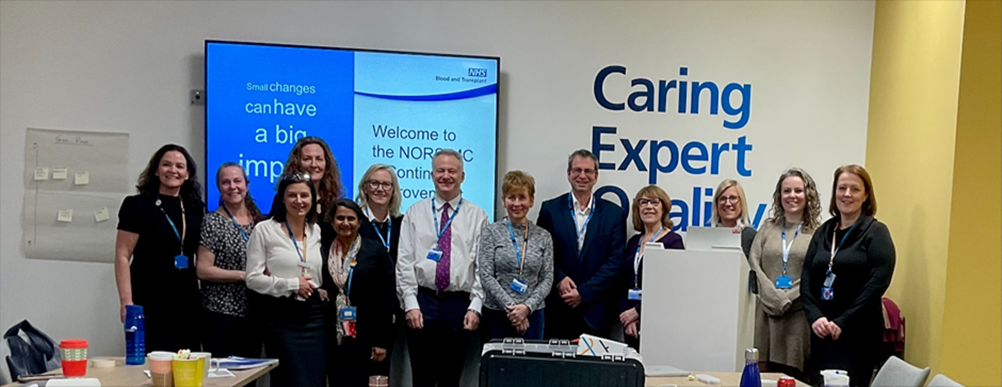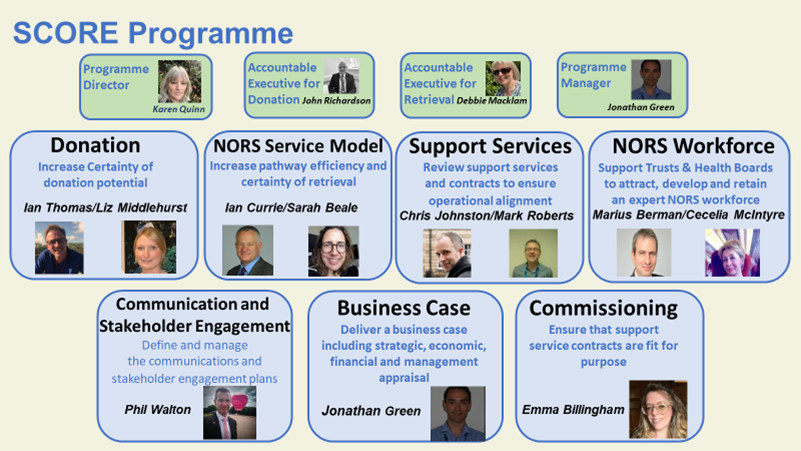Medical Director Bulletin
Monthly communication from the ODT Medical Director
Organ and Tissue Donation and Transplantation Directorate
February & March 2024
A message from Professor Derek Manas, Medical Director OTDT:

Hello again from me and the clinical team. 2024 is steaming ahead. The British Transplantation Society annual meeting is in Harrogate this year and I’m hoping to see many of you there.
As is usual I’d like to start by welcoming our new appointees - Carrie Scuffell and Jen Lumsdaine to the clinical team. Carrie is a CNS in transplantation from Newcastle, who will support Liz Armstrong in the transplant development team and Jen is a living donor nurse specialist from Edinburgh, who will support Lisa Burnapp with the living donor program. As you will remember, we said goodbye at the end of last year to Tracey Rees who retired as our Chief Scientific Officer (CSO) for H+I. We are very lucky to have David Briggs stepping into the breech to support us for the next six months together with members of Katy Latham’s NHSBT H+I senior team. Please see the message and accompanying letter further on in Liz Armstrong’s update.
I would also like to welcome Helen Jones a paediatric nephrologist from KCH who has been appointed as the new chair of the Paediatric Sub-Group of KAG. Finally, we have appointed Laura Barton as a Program Manager for to support us in delivering the OUG recommendations. Welcome all.
Unfortunately, we have to say goodbye to Professor Lorna Marson. Lorna has been invaluable as the OTDT AMD for Research and Development (R&D) in our clinical team and has done a sterling job pulling together all our research streams. Lorna has recently been appointed to the NHSBT Board as a Non-Executive Director (NED) and although she has left our team, we have not lost her totally, as her influence on the board will be invaluable for us. Congratulations Lorna. In the interim, her role will be covered by Rommel Ravanan, the AMD for Transplant Innovation, and he will chair the newly formed R&D Steering Group.
The Headlines:
SCORE:
The Sustainability and Certainty in Organ Retrieval program (SCORE) continues to gain momentum. Please see the update from Debbie Macklam the accountable executive for retrieval in Karen Quinn’s team (Program Director) further on in the bulletin.
Histopathology:
Unfortunately, we still await NHS England (NHSE) to implement the national plan, but the good news is that the funding for an interim plan has been agreed, thanks to Meena Saroy and together with Desley Neil we will be working towards implementing the plan as soon as possible. We will include a more detailed update in the next bulletin.
Living Donor Liver Transplantation:
The UK-wide Living Donor Liver Transplant (LDLT) Program – led by Lisa Burnapp has now received the funding from NHSE for the agreed ‘proctor team model’. We are hoping to deliver this over the next 18 months starting on the 1st of April.
OUG:
Work on the Organ Utilisation Group recommendations continues to progress. As mentioned before the DHSC Steering Group for Organ Utilisation (ISOU) have established several sub-groups and all have now been put in place and most have begun their work. The OTDT clinical team continue to work along side the sub-groups and we have representatives from OTDT on all the groups.
Recommendation 5 of the OUG report specifically stated - NHSE must undertake a comprehensive review of cardiothoracic services to ensure that services in place are sufficiently sustainable and resilient and are able to provide the best possible outcome for patients.
Following discussions at the ISOU board it was agreed that this review should be undertaken as soon as possible. As a result, DHSC and NHSE (Led by John Forsythe with support from NHSE and OTDT) have initiated the process. This will take place on the 22nd of April in London. The initial work will be primarily an information gathering exercise carried out by 3 external reviewers from European centres.
Clinical Collaboratives:
Recommendation 4 of the OUG report states that - Transplant units will build on the lessons learned during the COVID-19 pandemic and increase further the collaborative effort across units.
This work has been led by Gareth Jones from our clinical team. Many of you would have been engaging with Gareth as part of the program to establish Renal collaboratives. I’m pleased to report that all the Renal collaboratives are now established, and the leads and deputies are in place. The national steering group are due to meet with the leads in the next few weeks and start the serious work. The liver collaboratives are now in the process of being established followed by the cardiothoracic teams. I’d like to thank Gareth and my PA Abby Horne for all their hard work and commitment.
ERAS:
The Early Recovery after Surgery for transplant patients (ERASTx) has almost completed the work on ERAS for renal transplantation and continues to move forward with ERAS for liver transplantation. (Lisa Burnapp will be presenting the current ‘state of play’ at the BTS for those interested).
Sustainability Agenda:
The “Top tips on Making transplantation Green in your Unit” produced by the OTDT Environmental Sustainability Working Group will soon be available on the OTDT microsite.
For now, please use the attached link:
 The work continues and the NHSBT Working Group is looking for expressions of interest to join from across all health care professionals involved in transplantation. Expressions of interest (max. 500 words) can be directed to the co-chairs (Matt Wellberry Smith and John O’Callaghan) via the Medical Directors PA Admin Team Email: mdofficepas@nhsbt.nhs.uk
The work continues and the NHSBT Working Group is looking for expressions of interest to join from across all health care professionals involved in transplantation. Expressions of interest (max. 500 words) can be directed to the co-chairs (Matt Wellberry Smith and John O’Callaghan) via the Medical Directors PA Admin Team Email: mdofficepas@nhsbt.nhs.uk
BTS/NHSBT Monothematic meeting on Liver Perfusion:
Following the very successful meeting on the 2nd of November last year we plan to produce a consensus statement soon. This will be in conjunction with the ARC sub-group of ISOU led by John Casey.
Corneal Donation:
The lack of corneal tissue remains a priority for OTDT. There have been signs of improvement and the endorsement of establishing new Eye Retrieval Schemes has been the focus. We will include an update in the next bulletin.
UW Solution:
A new provider will hopefully be in place soon. The audit of outcome following the use of HTK continues.
Other:
Consent remains lower than we would like, and we are continuing with several initiatives on several fronts. There will be an update in the next bulletin.
Thank you to all who continue to support the work we do.

Yours sincerely,

Professor Derek Manas
Medical Director – OTDT
NHS Blood Transplant
Message from Liz Armstrong, Head of Transplant & Chris Callaghan, Associate Medical Director - Organ Utilisation:

Monday 16th September 2024:
National Organ Utilisation Conference
Please save the date in your calendars for the 2024 National Organ Utilisation Conference. More information to follow with regards to this event that brings together colleagues from the transplant community and beyond to discuss the challenges and opportunities in organ utilisation.
Message from Liz Armstrong, Head of Transplant:
Please see the attached letter regarding OTDT H&I Support from the 1 March 2024 for your information:
For any requests for support please email: OTDTHandIsupportrequests@nhsbt.nhs.uk
Message from Rommel Ravanan, Associate Medical Director, Transplant Innovation:
NHS England have approved APOL1 testing for potential living kidney donors to be included in the National Genomics Test Directory with immediate effect for patients that meet the testing criteria. Further details are in the attached communication document from NHS England.
British Transplant Society guidance on APOL1 testing in this scenario has also been recently published - APOL1 testing in Potential Living Kidney Donors - British Transplantation Society (bts.org.uk).
For patients in Scotland/Wales/Northern Ireland – please use your existing genomics testing pathways to access APOL1 testing. Depending on availability of testing capacity in the jurisdiction, the samples may be processed locally or utilise existing pathways for testing via NHS England Genomics Laboratory Hub network.
Message from Laura Ellis-Morgan, Head of Clinical Informatics:
The Headlines:
TransplantPath:
As you are aware, EOS is being decommissioned and replaced by TransplantPath in the coming weeks.
TransplantPath will be the single platform for viewing donor information when considering an organ offer.
The exciting new functionality will allow seamless sharing of documents, files, images and video in real time and accessible from a web browser on any device.
To ensure that you can continue to review organ offers you must action the steps previously emailed to you:
- Access FutureNHS to view the education package (TransplantPath Central Hub - FutureNHS Collaboration Platform)
- Accept the ‘Terms and Conditions of Acceptable Usage’https://forms.office.com/e/nZ2kgcAAwa
- Once you have completed step 1 and 2, you will be invited by email to access the Training Environment
TransplantPath is a welcomed and significant digital transformation stretching across the entire donation to transplantation pathway, please support the smooth go-live by taking the above actions promptly.
Message from Olive McGowan, Chief Nurse, Organ Donation & Transplantation:
Dear Colleagues,
Please find attached the report for April 2022- March 2023- Events investigated for possible donor-derived transmission of infections, malignancies.
I would like to take the opportunity to thank you all for reporting concerns, for your help with investigating and above all for sharing the learning.
Please do not hesitate to contact me should you have any questions at – olive.mcgowan@nhsbt.nhs.uk
Carry on reporting!
Olive
Cautionary Tales- Sharing learning from Events Across the Organ Donation & Transplant Pathway. ODT Clinical Governance Team Newsletter, Issue 33, January 2024:
The attached newsletter has been provided by: Jeanette Foley, Deputy Chief Nurse OTDT, for information:
Message from Dr Dale Gardiner, Associate Medical Director-Deceased Donation:
Joint BTS NHSBT Congress 2025
Will be held on: 12th-14th March 2025 in Brighton
Please save the date in your calendars for the 2025 Joint BTS NHSBT Congress 2025. More information will follow with regards to this event in the near future.
Message from the OTDT Professional Development Team:
Worldclass National Organ Retrieval Masterclass - Continuous Improvement Stakeholder Event
National Organ Retrieval Service (NORS) Masterclass
The NORS masterclass is a mandatory course for retrieval surgeons in the UK, it has been running for several years in different forms and has grown, adapted, and changed due to the covid pandemic and forever changing retrieval landscape. It is currently in 2 parts, 3 days virtual which is open to other NHS disciplines, and 2 days face to face cadaveric where surgeons are joined by perioperatives.
Why did we hold a Continuous Improvement event?
Behind a hugely successful NORS masterclass sits lots of people working together like cogs in a well-oiled machine! Long-term success requires hard work, discipline, and persistence. These three elements form the foundation of NORS masterclass success. To evolve and keep pace of the ever-changing environment in which we work, an ongoing cycle of planning, implementation of changes, evaluating results, and adjusting the approach by listening to feedback is required.
What we did
Twenty-one key stakeholders met face to face in Barnsley, despite storm Isha, to collaborate on the administrative, financial and course planning aspect of the NORS masterclass including course leadership and direction. Attendees included Course Directors -Transplant Surgeons, Peri-Operative Practitioners Business Support, finance, events@moore-insight, Chief Nurse, Heads of Education and Professional Development Specialists.
Together we mapped out the end-to-end process and highlighted areas that are working well and where the process can be improved and streamlined. Having all the expertise in one room, enabled a clearer understanding of one another’s job roles, requirements, and managed expectations. This year our processes are set to be even smoother and even more streamlined accounting for the various interdependencies.
There was great energy in the room as we took an iterative CI process with an experienced and trained (CI) facilitator to making small, yet impactful changes to existing practices.

From left to right: Cathy Miller, Janine Stockdale, Jill Featherstone, Olive McGowan, Manisha Patel, Jennifer Baxter, Ian Currie, Cecelia McIntyre, Marius Berman, Helen McManus, Louise Hubner, Alison Brereton, Jenny Hughes
Other stakeholders attended but not captured in the photo are: Fiona Hunt, Lynsey Farwell, Maxine Spivey, Shannon Oxley, Pat Phillips, Angela Perry, Tracey Noble, Candi Bond Gunning
The main achievement was streamlining the administrative processes such as the creation of a visual project planner to enable even more efficiencies around forward planning, advertising, room, and expert facilitator booking, to better serve the increasing NORS Masterclass remit including cadaveric, virtual and dcd lungs. In addition to the streamlining of the financial side of payments and invoices.
To achieve our aspirations, we set realistic goals, to help us develop good habits, stay focused, avoid distractions, and never give up. By embracing hard work, discipline, and persistence, together we can accomplish anything we set our minds to!
Recent Achievements:
The Masterclass Organising Group (MCOG) was the final 3 in the Collaboration category to drive change at the NHSBT TOGETHER AWARDS 2024.
MCOG Members: Ian Currie (Course Director), Marius Berman (Course Director), Olive McGowan, Cathy Miller, Chris Johnston, Cecelia McIntyre, Shahid Farid, Ahmed Sherif, Fiona Hunt, Lynsey Farwell, Simon Messer, Jennifer Baxter, Hassiba Smail, Emma Billingham, Helen McManus, Manisha Patel.
“Your attitude determines your altitude.”
(Zig Ziglar- famous motivational speaker and author).
Forthcoming Diary of National Organ Retrieval Services Education and Training:
4th April 2024: Donation after Circulatory Death (DCD) Lungs Normothermic Reperfusion (NRP)
12th, 13th & 14th November 2024: Virtual Masterclass
14th & 15th January 2025: Cadaveric Masterclass
Message from Debbie Macklam-Head of Service Development:
SCORE (Sustainability and Certainty in Organ Retrieval)
There have been many changes across the Organ Donation, Retrieval and Transplantation Pathway over the last 15 years since the initial Organ Donation Taskforce recommendations were implemented. The NHS is experiencing more challenges than ever with staffing and funding constraints and the donation/transplantation pathway has become more complex and demanding. Organ retrieval is more challenging than ever before with the use of novel technologies being used more often to increase organ utilisation from DCD donors.
Following a period of analysis and engagement, NHSBT have launched the SCORE Programme which aims to bring increased certainty to the Organ Donation, Retrieval and Transplantation Pathway with a view to supporting sustainability into the future. This is a key change from the current culture which focusses on donation, retrieval and transplant occurring as fast as possible.
The Programme is a ten-year programme with the initial focus over the next few years on laying the foundations for stability across the pathway.
This is a complex programme of change that will create benefits across the pathway the success of which is underpinned by the uniting of the component parts of the pathway for the greater benefit of the increased sustainability required to take donation, retrieval and transplant into the future.
Seven Workstreams have been set up with a wide range of stakeholder representation from donation, retrieval and transplantation communities to contribute to the scoping and definition of the changes that are required to achieve the objectives.
There are four Workstreams focusing on operational elements of the pathway: Donation; National Organ Retrieval Service (NORS) Model; Support Services and NORS Workforce.
There are three further Workstreams undertaking key Programme Level activities, input and oversight: Communication and Stakeholder Engagement; Business Case and Commissioning.

Donation
There are four objectives identified under the Donation Workstream, each initiative focussing on a particular part of donation to bring about changes that will increase efficiency, certainty and benefits to the wider pathway. The initiatives are being progressed via subgroups, each of which draws expertise and knowledge from colleagues across the pathway to support development of the changes required.
- Reduce the number of times organs go through the full offering process before being declined based on past medical history – by developing effective screening tools that will determine early in the pathway whether a donor is suitable this will reduce the amount of time spent offering organs that will not be accepted.
- Design and implement a national protocol to enable a consistent clinical approach to DCD donor assessment – by reviewing several pilots that are currently being undertaken around the UK to support development of a national approach to DCD donor assessment.
- Define and pilot the feasibility of advanced donor optimisation – by providing relevant clinical information to enable effective decision to ensure that organs are not offered / NORS teams are not mobilised to donors unable to donate.
- Define an acceptable time of day for organ offering – by moving organ offering from the current, often nighttime period, to daytime this will improve opportunities to discuss complex information with colleagues increasing efficiency and safety in the organ offering/acceptance process.
National Organ Retrieval Service (NORS) Model
The current donation, retrieval and transplant pathway is uncertain which leads to inefficiency and creates pressures across the system for donor hospitals, donor families, retrieval teams and transplant teams which are unsustainable. Considerable data regarding the timings along the whole pathway have been analysed and show that the length of the donation process has increased considerably, despite many efforts to reduce the length of the process. The current culture of as fast as possible results in retrieval being a daytime activity, often resulting in transplant taking place over night. Indications are that if the retrieval were to be moved back to a nighttime activity that could improve certainty in the pathway, making processes that underpin donation and transplantation far more planned, predictable and efficient.
The NORS Service Model Workstream is focused on three objectives which will provide foundations to bring benefits to the wider pathway.
- Define the optimum window for planned arrival of the NORS team – by fixing an arrival time window for the NORS teams this will bring certainty for donor families, donor hospitals and transplant teams, leading to reduced delays in the pathway. Following analysis, modelling, discussion and review over several Workstream meetings, the planned arrival window (PAW) that has been modelled with real time data is 10pm to 3am, with a key assumption that super urgent recipient cases would proceed as they do currently.
- Review alignment of retrieval capacity to address greatest donation potential and variations in team activity across the UK – by ensuring that teams are mobilised in the most efficient manner with proportionate activity to ensure sustainability across the UK, to enable support of future increased activity.
- Consider the inclusion of DCD heart and ANRP retrievals within the modelling – by including these important perfusion technologies which increase the pool, utilisation and outcomes of DCD organs for transplant. This is subject to confirmation of the substantive funding outlined in Business Cases submitted to the UK Health Departments.
Support Services
There are several support services that are integral to the donation, retrieval and transplant component parts of the pathway that may be impacted by some of the recommendations proposed by the Donation and NORS Service Model Workstreams. The Support Services Workstream is made up of key stakeholders from across the pathway and the support services to ensure that any impacts can be determined and assessed early to allow time to collaborate with the providers to develop solutions and appropriate plans.
The Workstream will review support services in light of any proposed changes to ensure operational alignment for:
- Transport – of organs, samples, NORS teams and SNODs
- Histocompatibility & Immunogenetics
- Microbiology
- Histopathology
Workforce
NORS is a key element of the wider pathway to facilitate the donation and transplantation of organs. Since COVID the fragility of teams has been increasingly evident with sickness, loss of key staff and retrieval surgeons being attracted to overseas roles. There are increasing difficulties for Trusts to attract and retain staff in roles that are working away from the hospital base for many hours, often being delayed and returning to base well after the end of a shift, impacting on staff wellbeing. NORS teams are employed by Trusts and commissioned by NHSBT to provide retrieval services. The Workstream has considered four objectives that will produce recommendations to support Trusts, with recognition that it is the Trusts who have the ability and the responsibility to accept the mantle to implement.
- Understand the impact of a planned arrival window for retrieval – by reviewing the output from the NORS Service Model Workstream in relation to current job plans for surgeons and perioperative staff.
- Empower teams to raise the profile of NORS within their Trust/Health Board – by developing a range of resources that can be used by NORS staff to increase awareness of the NORS service and roles within their Trust.
- Strengthen the NORS network – by identifying mechanisms to support shared learning and best practice across the UK NORS centres.
- Improve Trusts/Health Boards ability to attract and retain NORS staff – by developing a toolkit which Trusts can use to support recruitment and retention.
Communication and Engagement
A key part of the Programme is engagement with key stakeholders along the whole of the pathway, including patient and public representatives. It is important that time is taken to update communities and to provide opportunity for awareness, discussion and feedback to help shape the recommendations and output of the Programme. The key objectives are:
- Widen awareness of the SCORE Programme via communication and engagement.
- Identify any issues/risks to be managed.
Business Case
- Develop the strategic outline business case for NHSBT approval.
- Develop the full business case for approval to continue to implementation.
Commissioning
- Define the KPI's for the remodelled services.
- Develop support service contracts in line with SCORE recommendations.
- Provide appropriate engagement and notice for contract amendments.
As the Workstreams continue to evolve in the definition and scoping of the changes required to achieve the objectives there is ongoing engagement with colleagues and stakeholders across the pathway to provide opportunities for discussion, feedback and input.
Further information can be found on the ODT microsite Sustainability and Certainty in Organ Retrieval (SCORE) - ODT Clinical - NHS Blood and Transplant
For any questions or feedback the Programme can be contacted via SCORE@nhsbt.nhs.uk
Debbie Macklam
Head of Service Development – OTDT, NHSBT
